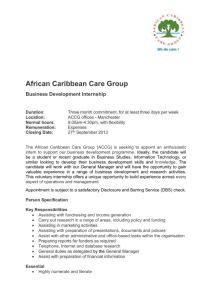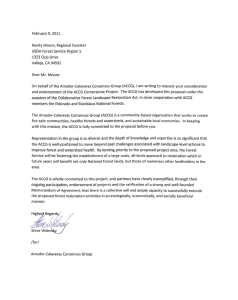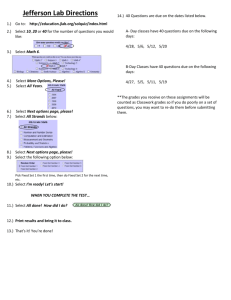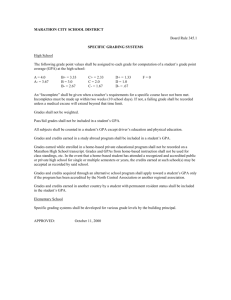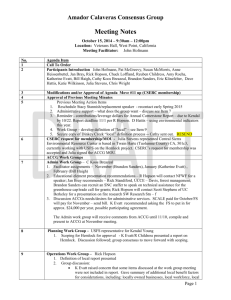FBE Examination Results Report Semester 2 2010 The results
advertisement
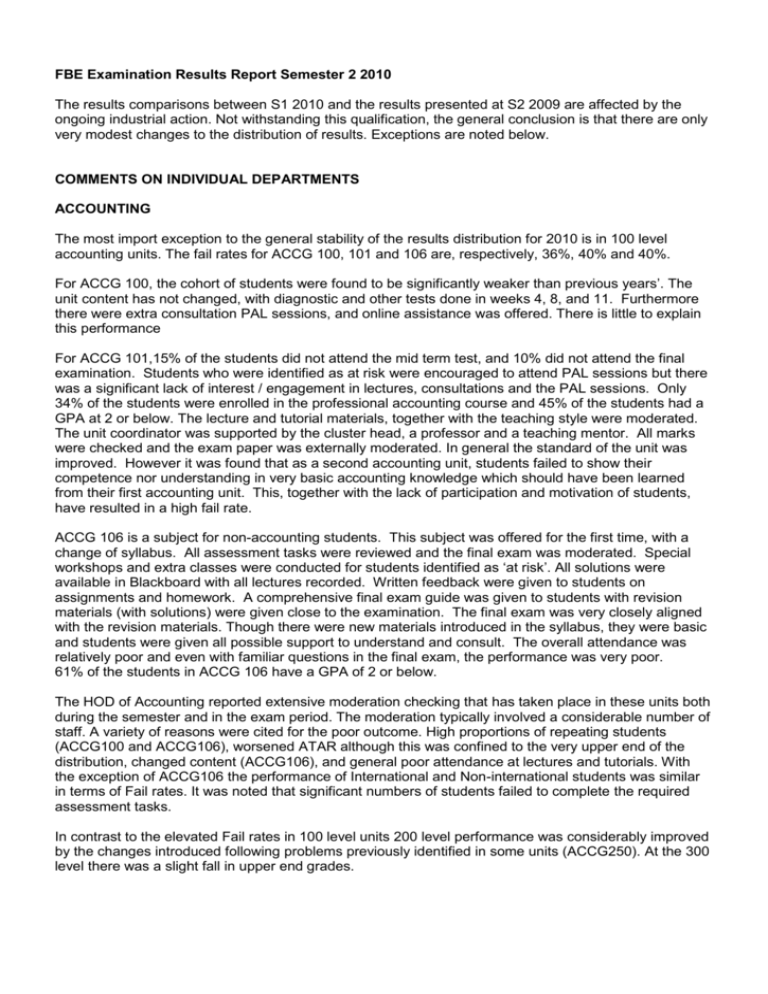
FBE Examination Results Report Semester 2 2010 The results comparisons between S1 2010 and the results presented at S2 2009 are affected by the ongoing industrial action. Not withstanding this qualification, the general conclusion is that there are only very modest changes to the distribution of results. Exceptions are noted below. COMMENTS ON INDIVIDUAL DEPARTMENTS ACCOUNTING The most import exception to the general stability of the results distribution for 2010 is in 100 level accounting units. The fail rates for ACCG 100, 101 and 106 are, respectively, 36%, 40% and 40%. For ACCG 100, the cohort of students were found to be significantly weaker than previous years’. The unit content has not changed, with diagnostic and other tests done in weeks 4, 8, and 11. Furthermore there were extra consultation PAL sessions, and online assistance was offered. There is little to explain this performance For ACCG 101,15% of the students did not attend the mid term test, and 10% did not attend the final examination. Students who were identified as at risk were encouraged to attend PAL sessions but there was a significant lack of interest / engagement in lectures, consultations and the PAL sessions. Only 34% of the students were enrolled in the professional accounting course and 45% of the students had a GPA at 2 or below. The lecture and tutorial materials, together with the teaching style were moderated. The unit coordinator was supported by the cluster head, a professor and a teaching mentor. All marks were checked and the exam paper was externally moderated. In general the standard of the unit was improved. However it was found that as a second accounting unit, students failed to show their competence nor understanding in very basic accounting knowledge which should have been learned from their first accounting unit. This, together with the lack of participation and motivation of students, have resulted in a high fail rate. ACCG 106 is a subject for non-accounting students. This subject was offered for the first time, with a change of syllabus. All assessment tasks were reviewed and the final exam was moderated. Special workshops and extra classes were conducted for students identified as ‘at risk’. All solutions were available in Blackboard with all lectures recorded. Written feedback were given to students on assignments and homework. A comprehensive final exam guide was given to students with revision materials (with solutions) were given close to the examination. The final exam was very closely aligned with the revision materials. Though there were new materials introduced in the syllabus, they were basic and students were given all possible support to understand and consult. The overall attendance was relatively poor and even with familiar questions in the final exam, the performance was very poor. 61% of the students in ACCG 106 have a GPA of 2 or below. The HOD of Accounting reported extensive moderation checking that has taken place in these units both during the semester and in the exam period. The moderation typically involved a considerable number of staff. A variety of reasons were cited for the poor outcome. High proportions of repeating students (ACCG100 and ACCG106), worsened ATAR although this was confined to the very upper end of the distribution, changed content (ACCG106), and general poor attendance at lectures and tutorials. With the exception of ACCG106 the performance of International and Non-international students was similar in terms of Fail rates. It was noted that significant numbers of students failed to complete the required assessment tasks. In contrast to the elevated Fail rates in 100 level units 200 level performance was considerably improved by the changes introduced following problems previously identified in some units (ACCG250). At the 300 level there was a slight fall in upper end grades. ACTUARIAL STUDIES The fail rate for ACST101 has increased by 5% over S2 2009. This change is smaller than that observed in S1 (9%) and in both cases there was a large increase in the PC rate. This is attributed to the introduction of the common year for the BCom and the lower mathematical skills of that group. This observation is consistent the significantly better International students in this unit. Both the ATAR and GPA distributions show a large drop in the upper ranges. The distribution is virtually identical to the S1 offering. BUSINESS Comparison with previous years shows consistency, except for 100 level units there is a marked trend for 0 or very low failure rates that are not consistent with the outcomes of units in other departments with similar grade distributions. The trend that began in the last reporting period to stretch out the grade distribution to include HDs has been reversed with decrease in upper end grades particularly in 300 level units. There was discussion of restrictions on the amount and assessment of group work and the Department is monitoring the issue having made change to some unit assessment modes. BUSINESS LAW Comparison with previous years shows consistency. ECONOMICS New staff in ECON241 and the introduction of a new text with extensive computer exercises administered through Blackboard produced a dramatic shift in the distribution towards HD and D grades. For the remainder of the units available there was no change in the distribution of results POSTGRADUTE Because of time constraints, the consideration of P/G results presented by HODs was abbreviated. The committee was of the view that they were not significantly different to those presented in previous years. There were no dramatic changes compared with S2 2009. There was a disturbing number postgraduate units with very small enrollments in Business and Business Law which will presumably be part of the process of unit rationalization foreshadowed by Dean for 2011. After the meeting the Chair performed a second check of the results. HONOURS Honours grades were reported only from Accounting 1 H1 4H2/1, Finance 6 H2/1 and Economics 3 H1 and 2 H2/1. There incomplete grades in Actuarial Studies, Business and Economics. General comment The time available for FBE to mark, collate, and scrutinize results was again inadequate. FBE has consistently asked for large units to be scheduled early in the examination period and the University has consistently ignored these requests. This puts an intolerable burden on staff to manage thousands of scripts. I would like a Senate resolution to that effect. This situation was exacerbated by the university software upgrade which took place and disrupted the uploading of results. I had academic and professional staff in the faculty after midnight trying to upload results. The Faculty will be reviewing the three 100 level Accounting units to understand why the fail rates are so high and inconsistent with previous years.
